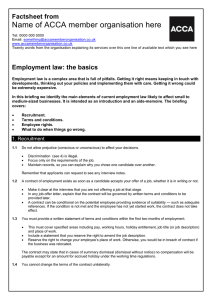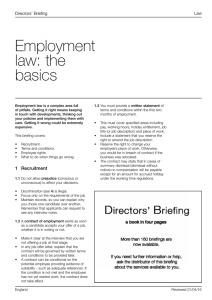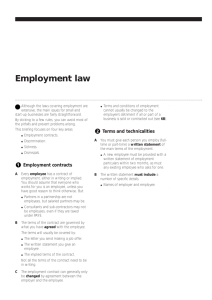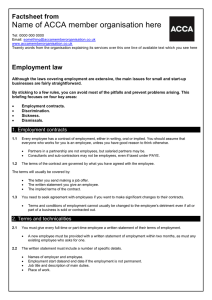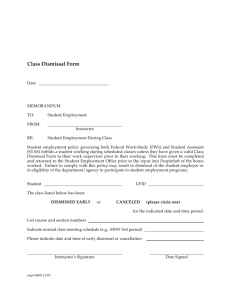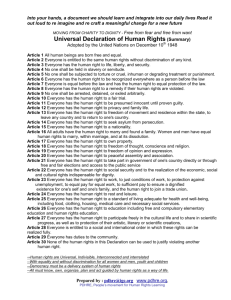Employment law: the basics
advertisement
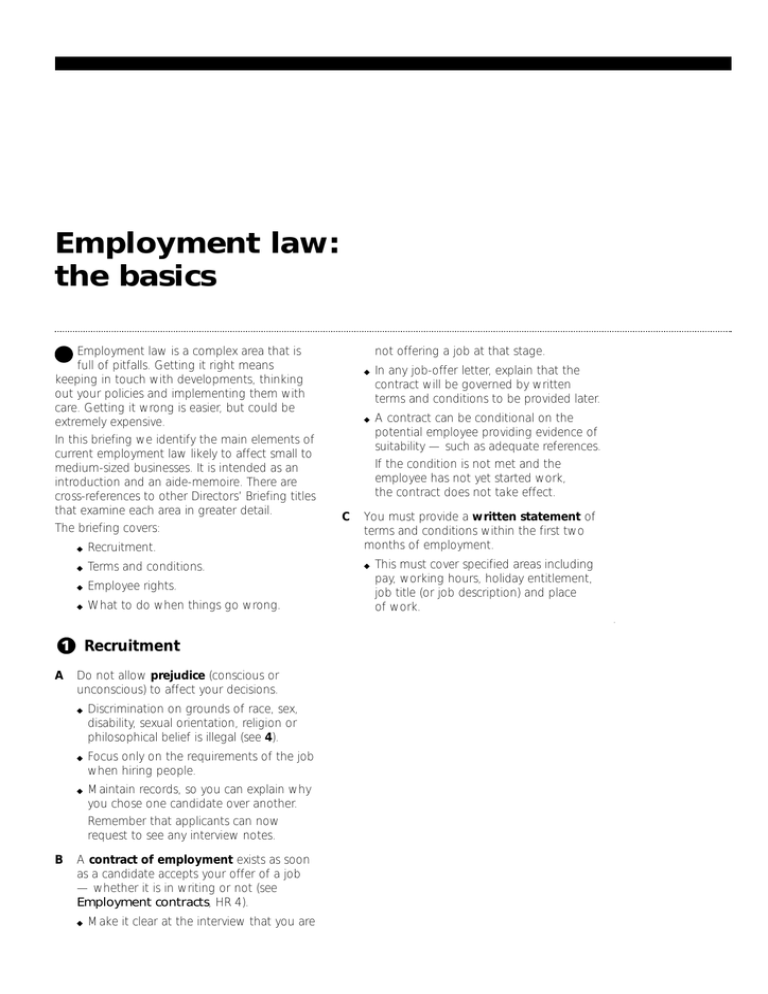
Employment law: the basics Employment law is a complex area that is full of pitfalls. Getting it right means keeping in touch with developments, thinking out your policies and implementing them with care. Getting it wrong is easier, but could be extremely expensive. In this briefing we identify the main elements of current employment law likely to affect small to medium-sized businesses. It is intended as an introduction and an aide-memoire. There are cross-references to other Directors’ Briefing titles that examine each area in greater detail. The briefing covers: ◆ Recruitment. ◆ Terms and conditions. ◆ Employee rights. ◆ What to do when things go wrong. Recruitment A Do not allow prejudice (conscious or unconscious) to affect your decisions. B ◆ Discrimination on grounds of race, sex, disability, sexual orientation, religion or philosophical belief is illegal (see 4). ◆ Focus only on the requirements of the job when hiring people. ◆ Maintain records, so you can explain why you chose one candidate over another. Remember that applicants can now request to see any interview notes. A contract of employment exists as soon as a candidate accepts your offer of a job — whether it is in writing or not (see Employment contracts, HR 4). ◆ Make it clear at the interview that you are not offering a job at that stage. C ◆ In any job-offer letter, explain that the contract will be governed by written terms and conditions to be provided later. ◆ A contract can be conditional on the potential employee providing evidence of suitability — such as adequate references. If the condition is not met and the employee has not yet started work, the contract does not take effect. You must provide a written statement of terms and conditions within the first two months of employment. ◆ This must cover specified areas including pay, working hours, holiday entitlement, job title (or job description) and place of work. ◆ Include a statement that you reserve the right to amend or add to the job description. ◆ Reserve the right to change your employee’s place of work. Otherwise, you would be in breach of contract if the business was relocated. ◆ Make sure the disciplinary procedure clearly states the grounds for which employees can be dismissed. These include gross misconduct, being convicted of a criminal offence (but see Dismissing employees, HR 5) and being off work for a given period through ill health (but see Discrimination, HR 24). The contract may state that in cases of summary dismissal (dismissal without notice) no compensation will be payable except for an amount for accrued holiday under the working time regulations. D You cannot change the terms of the contract unilaterally. ◆ Mothers and babies Pregnant women and new mothers have a number of special rights and entitlements. These include: Altering fundamental terms and conditions without the employee’s consent can be a breach of contract. Unless the change benefits the employee you could be sued for constructive dismissal, breach of contract, or both. A Paid time off for ante-natal care. B C 26 weeks’ statutory maternity leave, during which all her contractual rights (except remuneration) continue. ◆ You must inform her of the date when she is due to return to work. She can come back earlier but must give you 28 days’ notice. ◆ It is illegal to let a woman return to work within two weeks of childbirth, or within four weeks if the work is in a factory. Hours, leave and pay A You must comply with statutory requirements on working hours and leave (see Working time and the minimum wage, HR 25). Statutory maternity pay (SMP) if she has completed 26 weeks’ service by the end of the 15th week before the expected week of childbirth (EWC). ◆ ◆ You must pay SMP for 26 weeks but most, if not all of this, may be deductible from employer’s NI contributions. E If you have five employees or fewer and it is not reasonably practicable to offer suitable re-employment, special exemptions apply. The right to claim automatic unfair dismissal and sex discrimination if she is dismissed for any reason to do with the pregnancy or childbirth. ◆ Most employees are entitled to work a 48 hour maximum average working week. Each employee can voluntarily agree to disapply the rules. Any agreement must be in writing and signed by the worker. ◆ There are detailed regulations on minimum rest periods. ◆ Employees are entitled to a minimum of four weeks’ paid leave a year. ◆ Employees can also be entitled to maternity leave (see box), paternity leave, adoption leave, parental leave and leave for family reasons. Parental leave and leave for family reasons are unpaid, and there are limits on how much can be taken and when (see Holidays and unpaid and statutory leave, HR 37). ◆ An employee who is a parent with a child under six or a disabled child under 18 has the right to make a request for flexible working (see The law on flexible working, HR 38). ◆ Part-time workers have the right to be treated no less favourably than full-timers. So, for instance, part-timers are entitled to holiday on a pro rata basis. A woman who is ineligible for SMP but has paid enough NI can claim maternity allowance from the Department for Work and Pensions. D The right to return to work up to one year after having the baby, if she has 26 weeks’ service (by the end of the 15th week before the EWC). ◆ ◆ If she is dismissed, you must give written reasons for the dismissal without having to be asked. B Employees have the right to the national minimum wage which stands at £4.50 an hour (£4.85 proposed from October 2004). ◆ See Maternity issues and SMP, HR 22. There is a lower minimum wage of £3.80 (£4.10 proposed from October 2004) for page 2 those aged 18 to 21. C Employer’s National Insurance (NI) contributions are payable on employees’ pay and taxable benefits (see Tax and NI, TA 6). demoted, they can sue for full compensation — there is no monetary limit — for any losses incurred. G Each employee must get a pay statement. D You must deduct your employees’ tax and NI contributions from their wages, and pay them to the Inland Revenue under PAYE (Pay As You Earn). See Payroll, Fl 13. E Employers also have to account for employees’ tax and National Insurance on most benefits in kind. ◆ F Some benefits are free of tax and NI (see Remuneration, HR 26). In general, you may not make deductions from an employee’s wage packet unless you are required by law to do so, are recovering an overpayment of wages or have the employee’s written agreement beforehand. ◆ This must show total gross pay, deductions and net pay. ◆ Deductions (for example, pension contributions and union subscriptions) must be itemised. H All employees with more than one month’s service are entitled to a notice period (see Dismissing employees, HR 5). ◆ I Most employees are entitled to keep their jobs even if the business changes hands. ◆ Employee rights Employees have some rights which are implied (but not spelt out) in their contracts (see Employment contracts, HR 4). They also have rights which the contract cannot override. J B C Employees have reciprocal obligations to serve the employer honestly and faithfully and to work with due diligence and care. Employers must provide a secure, safe and healthy working environment (see Health and safety, LA 3). Discrimination A Treating someone less favourably because of their race, sex, disability, sexual orientation, religion or philosophical belief counts as direct discrimination. B Employees have the right to belong (or not to belong) to a trade union. ◆ Unions must be recognised (in businesses with 21 or more employees) where a specified percentage of the workforce votes for recognition. D Employees are entitled to a reasonable degree of privacy. ◆ In particular, the circumstances under which employers may monitor phone calls, emails or Internet use are regulated under the Data Protection Act and the Regulation of Investigatory Powers Act. E Employees are entitled to protection against discrimination (see 4). F Employees are entitled to blow the whistle on their employer’s wrongdoings. ◆ If they are subsequently sacked or In most cases, sackings would constitute unfair dismissal under the TUPE Regulations (see Redundancy, HR 20). Minimum standards in respect of disciplinary and grievance procedures will be implied into all employment contracts from October 2004. A Employers must not take any action which might undermine the relationship of ‘trust and confidence’ with their employees. ◆ The statutory minimum is one week (after one month’s service), rising to two weeks after two years, with a maximum of 12 weeks after 12 years. Indirect discrimination occurs if you impose a ‘provision, criterion or practice’ which members of one sex or one racial group are much less likely to be able to comply with, and which cannot be objectively justified. ◆ C For example, introducing irregular shiftworking patterns or only employing factory packers who have GCSE English. If you treat someone less favourably because of their actions (or potential actions) in connection with discrimination proceedings, it could count as victimisation. ◆ For example, failing to promote someone who has brought a sex discrimination case against you. D When dealing with disabled people, you must be prepared to make ‘reasonable adjustments’ to enable them to work or continue working. ◆ In some circumstances, you may be page 3 justified in refusing to make adjustments. For example, where you can prove it would be ineffective or not practicable or in breach of health and safety legislation. ◆ E grievance issues must be included in your employees’ written statement of terms and conditions. Make sure employees know what offences merit disciplinary action, and apply the rules consistently. ◆ Disciplinary procedures should follow the Acas Code of Practice. At present, companies with fewer than 15 employees are not affected by this law. As an employer, you are responsible not only for any discrimination which you practise, but also for any practised by your employees or even third parties in some circumstances. ◆ ◆ Be prepared to investigate complaints thoroughly and impartially. If the complaint is justified, be ready to offer redress and change your policies. New legislation establishing certain minimum procedures will come into effect in October 2004. B See Discrimination, HR 24. If you have to dismiss an employee, you may have to prove that you had good cause and acted reasonably (see Dismissing employees, HR 5). ◆ Good cause might include persistent or gross misconduct, incompetence, lack of qualifications or a legal bar on that employee doing that job. ◆ Inability to do the job because of frequent or prolonged absences due to sickness or injury might be grounds for dismissal (but see Sickness issues and SSP, HR 23). ◆ Redundancy might also be grounds for dismissal. But the reason must be genuine and the selection fair. Redundancy processes and timescales are carefully prescribed, and it is essential to follow them (see Redundancy, HR 20). Sickness A You must pay statutory sick pay (SSP) to qualifying employees (£66.15 a week in 2004/05, for up to 28 weeks). B C ◆ Employees qualify from the fourth day of incapacity onwards. ◆ They must earn more than the lower earnings limit of £79 a week. ◆ They must be aged between 16 and 65. ◆ You can withhold SSP under certain circumstances. Many employers pay higher levels of sick pay. ◆ It is common to continue with full pay for a given period, often up to six months. ◆ If your company’s arrangements are more generous than the statutory minimum, you can offset your payments against the SSP you would have had to pay. If the employee’s continued or repeated absences are causing real problems, in certain circumstances you can end his or her employment. ◆ The employee might take you to an employment tribunal, so you must be able to prove your actions were reasonable. See Sickness issues and SSP, HR 23. C Unlawful dismissal could land you in front of an employment tribunal (see Employment tribunals, HR 21). ◆ D An employee can claim unfair dismissal if he or she has been dismissed for an ‘unfair’ reason or if unfair procedures are followed. In general, they must have one year’s service and be under retirement age. But in some circumstances, age and length of service are immaterial (see Dismissing employees, HR 5). ◆ Where you have breached a fundamental term of the employment contract, or made it impossible for employees to do their job, they can sue for ‘constructive’ (unfair) dismissal. ◆ The basic award can be up to £8,100. But a tribunal also has powers to award compensation for financial loss up to a maximum of £55,000. Disciplinary issues A Make sure you have discipline and grievance procedures in place (see Discipline and grievance issues, HR 18). ◆ Basic information on disciplinary and It is illegal to dismiss anyone on grounds of race, sex, disability, sexual orientation, religion or philosophical belief. There is no statutory upper limit on the amount of compensation that can be awarded in such cases. page 4
